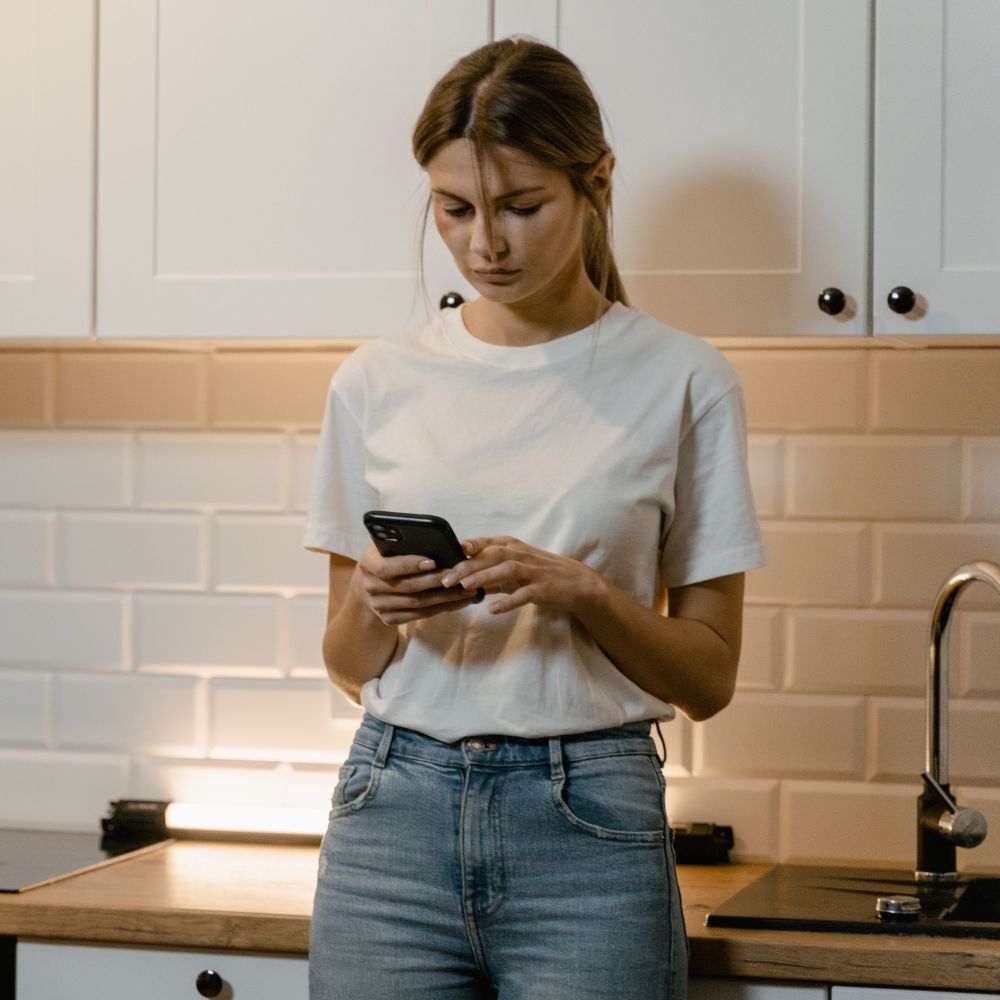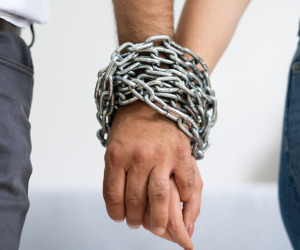The 4 attachment styles
Psychoanalyst, John Bowlby, determined 4 attachment styles that allow us to understand how we create a bond with another person. There are two determining parameters, our anxiety, and our avoidance. They are influenced by the creation of the bond with our parents during our childhood. It is therefore important to know and understand how we attach to others, for this, we must test ourselves!
Take our test to discover your love attachment style
Here, we will propose a series of questions. Answer them spontaneously, choosing the answer that most closely resembles you. Note which sign it corresponds to in order to count them at the end of the test: 🌹🔔☂️🌙. Here we go!
1. Throughout your childhood, your parents were:- 🌹 Present and supportive
- 🌙 Not very responsive and communicative
- ☂️ At the root of our problems
- 🔔 Not very present and busy with their various activities
2. When there was a family problem, it was quickly addressed and resolved:- 🌹 Strongly agree
- 🌙 Somewhat agree
- 🔔 Somewhat agree
- ☂️ Strongly disagree
3. As a child, you were described as:- 🔔 Unpredictable
- 🌙 Discreet
- ☂️ Turbulent
- 🌹 Wise
4. In life, you feel like:- 🌹 Doing what you can, the best you can
- ☂️ Being lost, you have the feeling of being stuck
- 🌙 Not being up to the task
- 🔔 Be alone in charge
5. At work, you are more of a:
- 🔔 Hardworking, but rather backward
- 🌙 An important part, but often doubtful of your work
- 🌹 Essential, you are the driving force behind the team
- ☂️ No idea, it's too hard to analyze
6. Your friends describe you as:
- 🔔 Independent and strong
- 🌹 Serene and confident
- 🌙 Generous and always present
- ☂️ Sensitive (even hypersensitive) and a good listener
7. Your biggest fear is:- 🔔 Not fulfilling yourself
- 🌙 Being alone
- 🌹 Being subjected to your emotions and those of others
- ☂️ A mixture of all the above
8. For you, love and relationship is:- 🌙 Vital and necessary
- 🌹 A big plus, but you're fine without it too
- 🔔 Hard to manage
- ☂️ A string of emotions as beautiful as they are horrible to experience
9. When you want to confess your feelings to someone, you are afraid they will reject you:- 🌙 Yes, this is your worst nightmare
- 🔔 No, because you'd rather not say it
- 🌹 It can be okay, it's never pleasant, but life goes on
- ☂️ Yes, but you're not going to let it go
10. In relationships, you:- 🔔 Run away, you suffocate in them
- ☂️ Suffer, nothing is a quiet river
- 🌹 Enjoy, no matter if for one night or life
- 🌙 Go for it, being single is out of the question
11. An argument breaks out with your partner, how do you react?:
- ☂️ You explode and tell him his 4 truths, there's enough of it
- 🌹 You try to make the tension go down, you put everything down
- 🌙 You're stressed, and you're afraid of your partner's reactions
- 🔔 You leave the room so he or she can calm down
12. Long-distance relationships are:
- 🌙 Horrible to live with, it's not possible for you
- 🔔 A way to have time for yourself
- ☂️ Chaotic, hard for you to manage
- 🌹 Neither hell nor a pleasure, it's the person that counts
13. Your previous relationships have failed because:
- 🔔 You weren't invested.
- ☂️ You were too impulsive, you like passion
- 🌙 You were too dependent
- 🌹 It didn't stick, the separations were pretty good
14. You rarely worry about being abandoned in the relationship
- 🔔 Totally agree
- ☂️ Somewhat agree
- 🌹 Somewhat agree
- 🌙 Strongly disagree
15. In your relationship, the mental load is divided:- 🌹 In a balanced way, it is all about communication
- ☂️ In a chaotic and changing way
- 🔔 In a rigorous way, everyone knows what he or she should do
- 🌙 You manage everything, everything goes through you
16. What is paramount when you are in love is:- ☂️ Passion, it's all fire or none at all
- 🌹 Communication and kindness, in short, a sweet relationship
- 🌙 The contact, to feel close to your partner
- 🔔 A relationship where everyone keeps their independence
17. Showing your affection to your partner is:- 🌹 Easy, it's normal to do so
- 🌙 Easy, but you're afraid to do too much
- ☂️ Easy, but he has to return everything to you
- 🔔 Not easy, you are afraid he will leave afterward
18. If you could change one thing in your relationship, it would be:
- 🌹 To be even better at listening and communication.
- 🌙 To understand your partner better to make him happier
- 🔔 To listen to yourself more, you need it
- ☂️ To repair past mistakes to feel less guilty
|
Results of the attachment style test
The test is over, you will be able to see which symbol is the most recurrent. Read what it corresponds to, but don't hesitate to take a look at the other attachment styles to understand all the mechanisms.
Your answers have given you the most 🌹 : your attachment style is "secure"!
You have everything you need to have a calming romantic relationship because you have low levels of anxiety and avoidance. Your relationships are generally long-lasting, healthy, and satisfying. There are occasional bumps in the road, but overall, you manage to overcome them through good communication. In any case, it's not your emotions and fears that disrupt the relationship!
You have a maximum 🌙: your attachment style is "preoccupied"!
This attachment style shows that you have a high level of anxiety about the relationship, which reflects a feeling of abandonment. You feel insecure, especially because you were not reassured enough as a child, which created an emotional dependency in you. You have the feeling of being a weight for the other person and at the same time, you are afraid of being left, which makes you have negative emotions like jealousy 🤕...
You have a maximum of 🔔: your attachment style is "detached"!
You have little attachment, you prefer to be alone, and you have difficulty investing yourself in the couple. This is a behavior that usually reflects a rejection wound because your parents did not show you enough love during your childhood. You are afraid of commitment because you feel that you will suffer. You, therefore, prefer to maintain a distance and not to invest yourself so as not to relive this suffering, but this prevents you from building a lasting relationship.
You have a maximum of ☂️: your attachment style is "avoidant/fearful"!
This love attachment style shows that you have both high anxiety and a high level of avoidance. This is a reflection of a lot of pain and unfortunately, your romantic relationships are often toxic. You find it hard to get emotionally attached, or it's the opposite, it has to be full of passion, but it's fleeting. In short, you have difficulty understanding your relationships in general, and you often encounter difficulties.
And after this test?
It is important to keep in mind that this test is purely for entertainment purposes, it does not replace a discussion with a therapist. However, it can be a way to question ourselves by taking a step back in our love relationships. From there, we can try to go into introspection to detect our behaviors and defense mechanisms. We have them because we have fears that were provoked by our attachment to our parents. This influences our relationships once we are adults, which is important to work on.
👉 If you have emotional wounds that prevent you from fully blossoming, don't hesitate to be accompanied via therapy to truly understand what makes you suffer.
Understanding attachment patterns in the digital age
Modern technology has created new dimensions in how we form attachments. Dating apps, social media, and instant messaging have transformed how we connect, potentially intensifying our attachment patterns. Someone with an anxious attachment style might find themselves constantly checking their phone, while an avoidant person might use digital barriers to maintain emotional distance.
The impact of childhood trauma on adult relationships
Recent neuroscience research reveals how early experiences shape our attachment patterns at a biological level. Childhood experiences literally wire our brains to respond to relationships in specific ways, but understanding this can be the first step toward healing. This knowledge helps explain why changing our attachment style requires both emotional and neurological rewiring.
Breaking the cycle: healing attachment wounds
While our attachment style may feel fixed, it can evolve with conscious effort and understanding. The key lies in recognizing our patterns and gradually building new, healthier responses to relationship triggers. This process often involves:
Creating new neural pathways
Each time we respond differently to our attachment triggers, we create new neural connections. This process of neuroplasticity means that even deeply ingrained attachment patterns can be modified through consistent, mindful practice. The brain's ability to form new pathways offers hope for those looking to develop more secure attachment styles.
Cultural influences on attachment styles
Attachment patterns vary significantly across cultures, challenging the one-size-fits-all approach to understanding relationships. What might be considered anxious attachment in one culture could be viewed as normal emotional expression in another. This cultural awareness adds an important dimension to understanding our attachment style.
Editor’s opinion: An important step towards awarenessThis test can bring to light some of our behaviors in a relationship, it is a first step that can make you aware of your actions. Of course, it is not so simple, and it does not replace a consultation with a psychologist. If the same pattern repeats itself over and over again in your relationships, it is time to question yourself and make an appointment with a psychologist. Over the course of the sessions, you will be able to understand the origin of these behaviors and put in place new habits that will allow you to live happier relationships.
🤗 Understand yourself, accept yourself, be happy... Let’s do it here and now!
#BornToBeMe Connect with an advisor |
Be sure to check out these articles too;
















